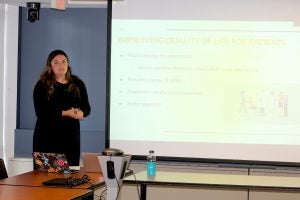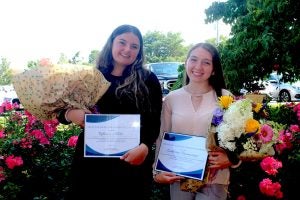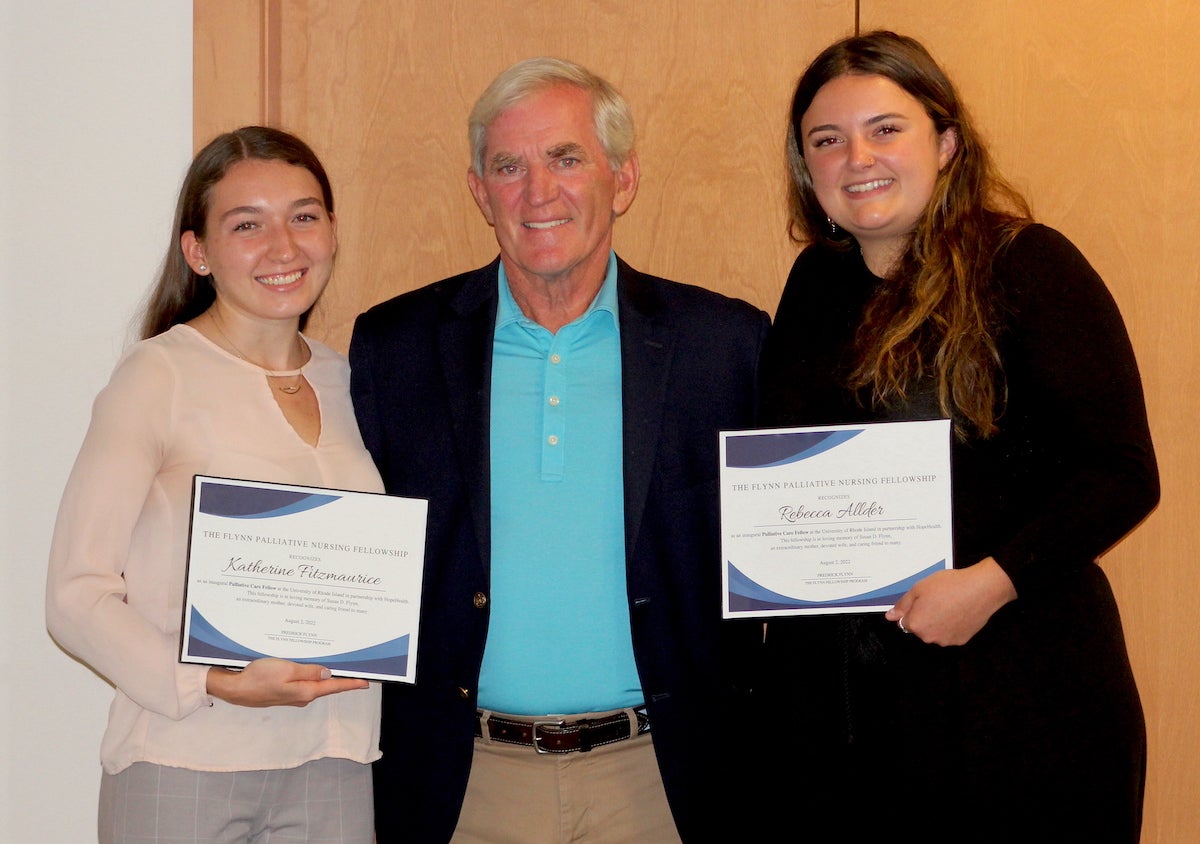URI nursing students Rebecca Allder and Katherine Fitzmaurice completed the eight-week internship program at HopeHealth in Providence
Two University of Rhode Island College of Nursing students have enhanced their expertise in palliative care and contributed to palliative care knowledge through their research projects, as the inaugural participants in the Susan D. Flynn Palliative Care Undergraduate Fellowship graduated from the program Aug. 2.
Rebecca Allder and Katherine Fitzmaurice, both entering their senior year at URI, received certificates of completion during a ceremony at HopeHealth Hulitar Hospice Center in Providence, which partners with URI to provide experiential learning to the students. The two students are “committed to providing person-centered care that is based on the seriously ill person and family’s beliefs, values, and goals,” according to Associate Professor Susan Desanto-Madeya, the College’s Miriam Weyker Chair, who heads the Flynn Fellowship.
During the ceremony, the students presented the research projects they spent the academic year pursuing, while working with HopeHealth personnel to help provide palliative care, which offers comfort and relief from a serious, progressive illness that may or may not be life-limiting.
 Allder’s project focused on comfort feeding versus sustenance feeding for patients in palliative care. She reported that food plays an important role in a patient’s well-being and socialization. While there may be risks to self-feeding for some patients, for those who are able, eating can enhance quality of life and make the patient feel more autonomy.
Allder’s project focused on comfort feeding versus sustenance feeding for patients in palliative care. She reported that food plays an important role in a patient’s well-being and socialization. While there may be risks to self-feeding for some patients, for those who are able, eating can enhance quality of life and make the patient feel more autonomy.
“We want to make patients as comfortable as possible, and food plays an important role in that,” Allder said. “If it’s not going to hurt them, give them what they want.”
 Fitzmaurice focused on the impact of respite care for pediatric patients, giving parents whose children are facing serious illness a much-needed rest from the constant stress of caring for an ill child. Her study found that respite care allowed parents to rest, spend quality time with other children, and generally feel some freedom from stress while palliative care nurses temporarily take over the duties of care. The program also benefits the children, allowing them to socialize with other children in similar situations, and have an opportunity to talk to a caregiver about issues they may not want to with their parents.
Fitzmaurice focused on the impact of respite care for pediatric patients, giving parents whose children are facing serious illness a much-needed rest from the constant stress of caring for an ill child. Her study found that respite care allowed parents to rest, spend quality time with other children, and generally feel some freedom from stress while palliative care nurses temporarily take over the duties of care. The program also benefits the children, allowing them to socialize with other children in similar situations, and have an opportunity to talk to a caregiver about issues they may not want to with their parents.
“There is a strong association between parent well-being and child well-being,” Fitzmaurice said. “There are numerous benefits for the patient, the parents and the whole family, but it is still a very underutilized service.”
 The Flynn Fellowship, a preceptor-based internship program, is sponsored by Fred Flynn in memory of his wife, Susan, who died of ovarian cancer. The specialized fellowship program is intended to stimulate career interest and foster the professional development of much-needed future palliative care nurses. The program is designed to enhance the student’s “experiential learning” opportunities including person/family care, internal meetings and educational forums. By producing well-educated, skilled, and prepared future Palliative Care Nurses, the program’s ultimate goal is to help optimize the quality of life of patients and families living with serious illnesses.
The Flynn Fellowship, a preceptor-based internship program, is sponsored by Fred Flynn in memory of his wife, Susan, who died of ovarian cancer. The specialized fellowship program is intended to stimulate career interest and foster the professional development of much-needed future palliative care nurses. The program is designed to enhance the student’s “experiential learning” opportunities including person/family care, internal meetings and educational forums. By producing well-educated, skilled, and prepared future Palliative Care Nurses, the program’s ultimate goal is to help optimize the quality of life of patients and families living with serious illnesses.
Desanto-Madeya and the College are seeking the next cohort of Flynn Palliative Care Fellows. Email Desanto-Madeya at sdesanto-madeya@uri.edu for more information on applying.

